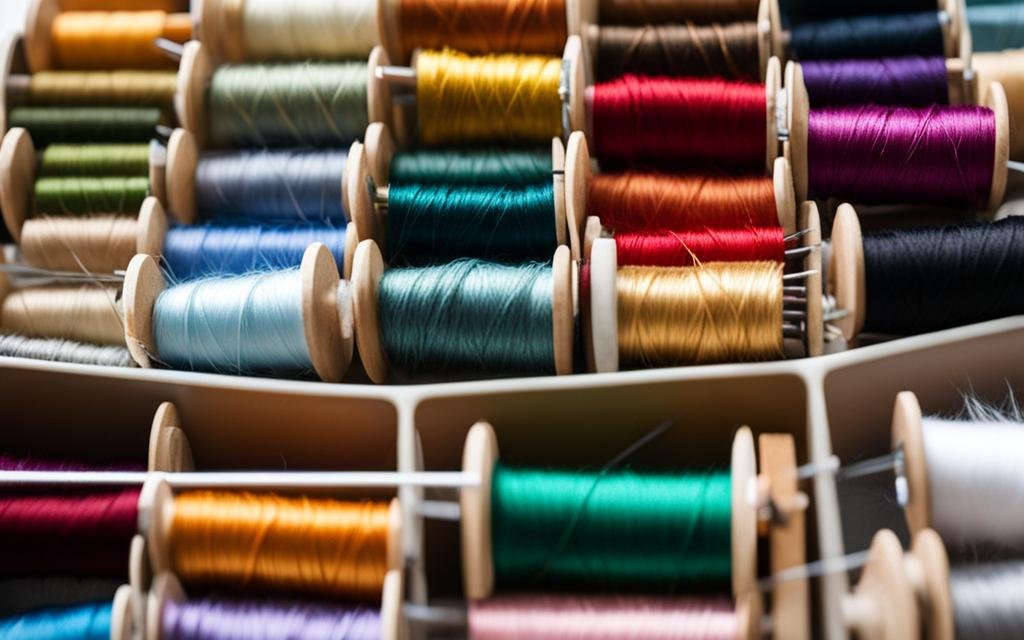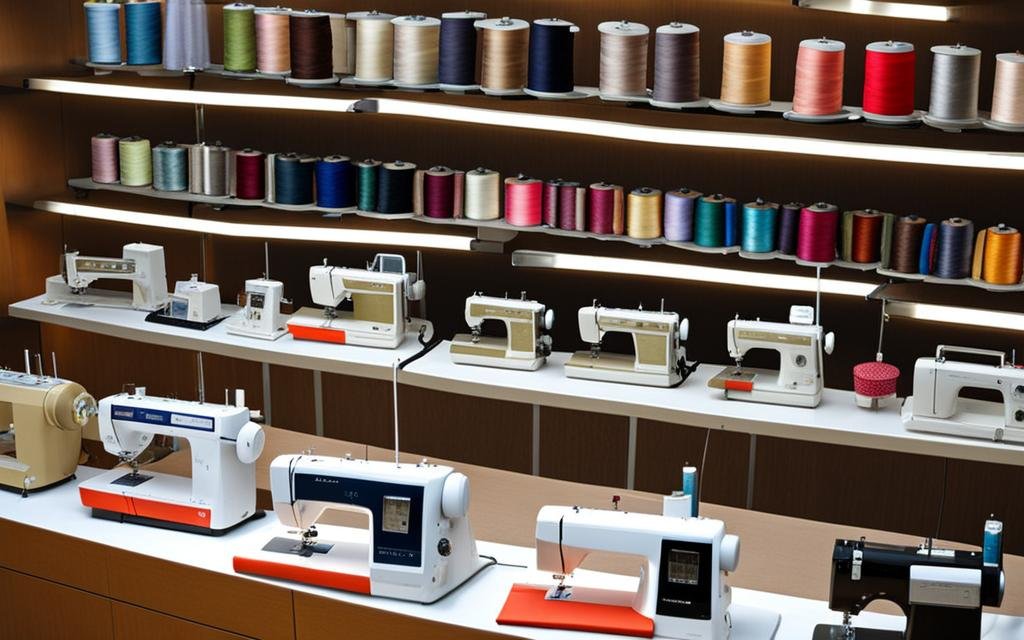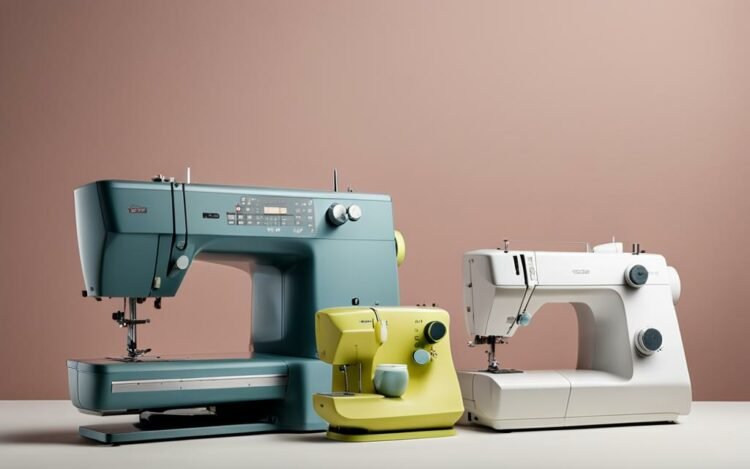Whether you’re a beginner or looking to upgrade your current sewing machine, choosing the right machine can be overwhelming. To make an informed decision, it’s important to consider factors like your sewing frequency, the types of projects you plan to work on, and the features you need. By taking the time to pre-interview yourself and research machines, you can find the perfect sewing machine that suits your needs.
Key Takeaways
- Consider your sewing frequency, project requirements, and budget when choosing a sewing machine.
- Answer key questions about how often you will be using the machine and the types of projects you plan to work on.
- Keep these 10 tips in mind when shopping for a sewing machine, including considering the stitches you actually need and testing the machine with the fabrics you plan to sew with.
- Look for essential machine features like adjustable stitches and buttonhole capabilities, and consider accessories like presser feet.
- Set aside a realistic budget for your sewing machine purchase, aiming to invest at least $200 in a new, basic machine.
Preparing for Machine Shopping: Answering Important Questions
Before you start shopping for a sewing machine, it’s important to answer some key questions that will help guide your decision-making process. By considering these factors, you’ll be better equipped to choose a machine that suits your needs.
1. How often will you be sewing?
Think about how frequently you plan to use your sewing machine. If you’re a casual sewer, a basic machine with essential features may be sufficient. However, if you’re a more frequent or advanced sewer, you may want to invest in a machine that offers more versatility and durability.
2. What types of projects do you plan to work on?
Consider the types of projects you’ll be undertaking with your new sewing machine. If you’re mainly focused on simple alterations or basic garment construction, a straightforward machine will likely meet your needs. However, if you’re interested in quilting, embroidery, or other specialized techniques, look for machines with specific features designed for those purposes.
3. What are the features and limitations of your current machine?
If you already have a sewing machine, take note of its features and any limitations you’ve encountered. This will help you identify what you would like to upgrade or improve upon in your new machine. Whether it’s a wider range of stitches, automatic threading, or a larger workspace, having a clear understanding of your current machine’s strengths and weaknesses will guide your search.
By taking the time to answer these questions, you’ll have a better sense of what you need from a sewing machine. This will make the shopping process less overwhelming and ensure that you find a machine that aligns with your sewing goals and preferences.
11 Tips for Buying a Sewing Machine
When it comes to buying a sewing machine, there are some important tips to keep in mind. Whether you’re a beginner or a seasoned sewist, these tips will help you make the right choice and find a machine that suits your needs. So, before you make your purchase, consider the following:
- Consider the stitches you actually need: Think about the type of projects you’ll be working on and determine the necessary stitch capabilities. Don’t be swayed by machines with a multitude of fancy stitches if you won’t use them.
- Pay for the features you will use: Similar to stitches, focus on features that are important to your sewing style. For example, if you will be doing a lot of quilting, make sure the machine has a quilting foot and a large throat space.
- Buy from a reputable dealership, not a big chain store: While it may be tempting to buy a sewing machine from a big-box retailer, it’s often better to purchase from a dedicated sewing machine dealership. The staff at these stores are usually more knowledgeable and can provide better support.
- Explore webinar classes if you can’t find a dealership: If there are no sewing machine dealerships in your area, consider looking for online webinar classes. These classes can help you learn about different machines and their features, giving you a better understanding of what to look for.
- Sit down and sew on the machine before making a decision: If possible, try out the machine before buying. Sitting down and actually sewing on it will give you a feel for its operation and help you determine if it’s the right fit for you.
- Test the machine with the fabrics you plan to sew with: Bring samples of the fabrics you commonly work with to test on the machine. This will give you an idea of how the machine handles different materials and if it can meet your sewing needs.
- Choose a machine that you can grow into: Consider your long-term sewing goals and choose a machine that can grow with you. You don’t want to outgrow your machine too quickly, so opt for one with room for advancement as your skills improve.
- Gather as much information as possible, but be mindful of reviews: Do your research and read up on different sewing machines. However, be cautious of relying solely on reviews, as they can be subjective. Use them as a guide, but ultimately trust your own judgment.
- Don’t be afraid to buy used, but test the machine before buying: Buying a used sewing machine can be a cost-effective option, but make sure to thoroughly test the machine before making a purchase. Check for any mechanical issues or signs of wear and tear.
- Seek advice from the sewing community if you’re still unsure: If you’re still uncertain about which sewing machine to buy, don’t hesitate to seek advice from the sewing community. Online forums and social media groups can provide valuable insights and recommendations.
- Use online coupons like the SewingMachinesPlus discount codes for exclusive savings on all your sewing Machine.
By keeping these tips in mind, you’ll be well-prepared to buy a sewing machine that meets your needs and helps you embark on your sewing journey.
Essential Machine Features and Accessories
When selecting a sewing machine, it’s important to understand the essential features and accessories you’ll need. These factors will determine the versatility and functionality of your machine, allowing you to complete a wide range of sewing projects with ease.

- Adjustable Stitches: Look for machines that offer a variety of stitch options, including straight, zigzag, and decorative stitches. This will give you the flexibility to create different designs and finishes.
- Buttonhole Capabilities: A sewing machine with built-in buttonhole capabilities will make creating buttonholes quick and easy. Look for machines that offer one-step or four-step buttonhole functions.
- Adjustable Stitch Width and Length: Being able to adjust the width and length of your stitches allows you to customize your sewing projects to your desired specifications.
Sewing Machine Accessories:
- Presser Feet: Presser feet are attachments that help control the fabric as it moves through the machine. Essential presser feet include the regular foot for general sewing, zipper foot for inserting zippers, buttonhole foot for creating buttonholes, and walking foot for sewing multiple layers or slippery fabrics.
- Bobbin and Bobbin Case: The bobbin and bobbin case hold the thread beneath the fabric, allowing the machine to create a stitch. Ensure that your machine comes with a sufficient number of bobbins and a removable bobbin case for easy threading and maintenance.
- Thread Cutter: A built-in thread cutter on your machine can save time and make your sewing process more efficient.
- Needles: Different sewing projects require different types and sizes of needles. Look for a machine that comes with a variety of needles to accommodate different fabrics and techniques.
By considering these essential machine features and accessories, you’ll be well-equipped to choose a sewing machine that meets your needs and allows you to explore your creativity.
Budgeting for a Sewing Machine
When it comes to buying a sewing machine, setting a budget is an important step in the decision-making process. Determining how much to spend on a sewing machine depends on various factors, such as your sewing needs, experience level, and long-term goals. While there are affordable sewing machines available, it’s essential to balance your budget with the features and quality you require.
Before finalizing your budget, consider the frequency of your sewing projects. If you’re a beginner or only sew occasionally, opting for a lower-priced machine may suffice. However, if you’re an experienced sewist or plan to tackle complex projects regularly, investing in a higher-quality sewing machine with advanced features may be a wise choice.
While entry-level sewing machines can be found for under $100, it’s advisable to allocate at least $200 for a new, basic machine. This price range ensures better build quality, improved durability, and a wider range of functions. Keep in mind that purchasing from big box stores may lead to lower-quality machines, so it’s worth exploring options from reputable dealers or repair shops.

If you’re on a tight budget or looking for a more cost-effective option, consider buying a used sewing machine. Reputable dealers or repair shops often offer serviced machines at lower prices, allowing you to get a higher-end machine for a fraction of the cost. However, be sure to thoroughly test the machine before purchasing to ensure its functionality and condition.
By determining your sewing needs, evaluating your budget, and considering the available options, you can find an affordable sewing machine that meets your requirements and enables you to unleash your creativity.
Conclusion
Final Thoughts on Buying a Sewing Machine
Buying a sewing machine is an exciting and important decision. With so many options available, it’s crucial to take the time to consider your sewing needs, project requirements, and budget. By following the tips and considerations outlined in this definitive guide, you can make an informed decision and find a sewing machine that suits your unique needs.
Remember, your sewing frequency and the types of projects you plan to work on are key factors in choosing the right machine. You’ll want to ensure that the machine you select has the necessary features and accessories to support your creative endeavors. Additionally, it’s essential to establish a realistic budget and avoid compromising on quality.
Whether you’re a beginner or an experienced sewist, finding the perfect sewing machine can greatly enhance your sewing experience. With the right machine by your side, you’ll be ready to embark on your sewing journey and enjoy the creative process to its fullest. Happy sewing!

